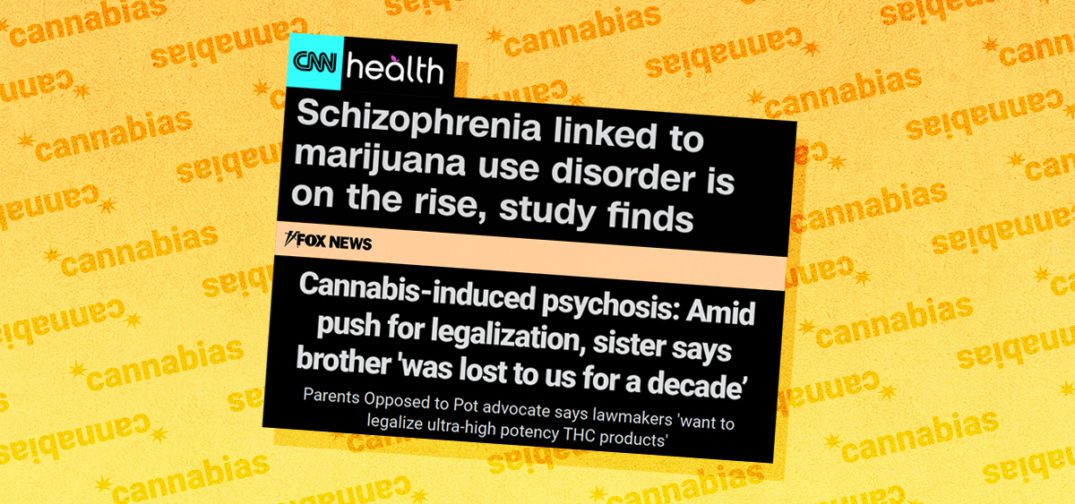In this edition of Canna-Bias, we examine how mainstream news organizations covered a recently-released study from Danish researchers on the possibility of a link between cannabis use and schizophrenia.
The article by CNN, “Schizophrenia linked to marijuana use disorder is on the rise, study finds,” and the article by Fox News, “Cannabis-infused psychosis: Amid push for legalization, sister says brother ‘was lost to us for a decade,'” were quick to publish eye-catching headlines but both failed to provide accurate context.
Presence of bias
Although its coverage came on the heels of CNN’s, Fox News didn’t even address the Danish study, instead leading their story with a cannabis opponent who describes lawmakers talking about legalizing cannabis “like it’s chamomile tea.” This alone amounts to attribution bias, as one would be hard-pressed to find a single federal lawmaker who would approve of a cannabis bill that would allow sales in the same manner as tea – available far and wide to anyone with $6.00, at farmers’ markets, and growing on the windowsills of grandmothers around the country.
The Fox News story, moreover, relies on the opinion and experience of one anti-cannabis advocate – a singular story – with an agenda to push. Fox News also buries a key detail of the Reefer Madness-like tale deep within the article – that the brother of the anti-cannabis zealot “suffered from an undiagnosed mental illness” which may have contributed to his schizophrenia, rather than the cannabis he consumed.
To CNN’s credit, one source who is quoted points to people who seek treatment for so-called ‘cannabis-use disorder’ saying that they “tend to have multiple mental health problems” and that “there are far more recreational cannabis users who manage cannabis well than cannabis-dependent users who cannot manage it.” However, the CNN story buries quotes from the study author to the sixth graph, where he notes that the study’s “findings will have to be replicated elsewhere before firm conclusions can be drawn.”
The CNN story doesn’t even include a key quote until the very last graph (structural bias) where Tyler J. VanderWeele, a professor in the Departments of Epidemiology and Biostatistics at the Harvard T. H. Chan School of Public Health, says that “cannabis use disorder is not responsible for most schizophrenia cases, but it is responsible for a nonnegligible and increasing proportion.”
Taken together, both stories – published four days apart – mislead readers with wild headlines that are not entirely accurate.
How to remedy
Perhaps unsurprisingly, the Fox News story is–more or less–a hit piece, and uses one biased source for the entire story. If the author wanted to pursue this topic from an actual journalistic perspective, the article would need to be completely rewritten with a wider lens and additional sources.
CNN’s coverage of the Danish study could be improved by referencing the study author’s own notes about the limitations of the study earlier, and including commentary from qualified experts before the writer’s analysis & speculation based on those comments. The CNN article could also have reached out to additional experts on the topic of cannabis as it pertains to mental health.
Context is another factor that is lacking in these articles. For example, neither Fox News nor CNN discusses the criminal justice implications of legalization (with an estimated 40,000 people still in prison for cannabis-related offenses), or the fact that the U.S. ranks 37th in the world for healthcare and that about half of all Americans with mental illness don’t receive the treatment they need, which could exacerbate symptoms of schizophrenia and psychosis more than cannabis use. For comparison, there is also no mention of the many widely-known health problems associated with legal substances like alcohol and tobacco — or comparable medical terms like ‘alcohol use disorder,’ ‘tobacco use disorder,’ or ‘opioid use disorder.’
Get daily cannabis business news updates. Subscribe
End
